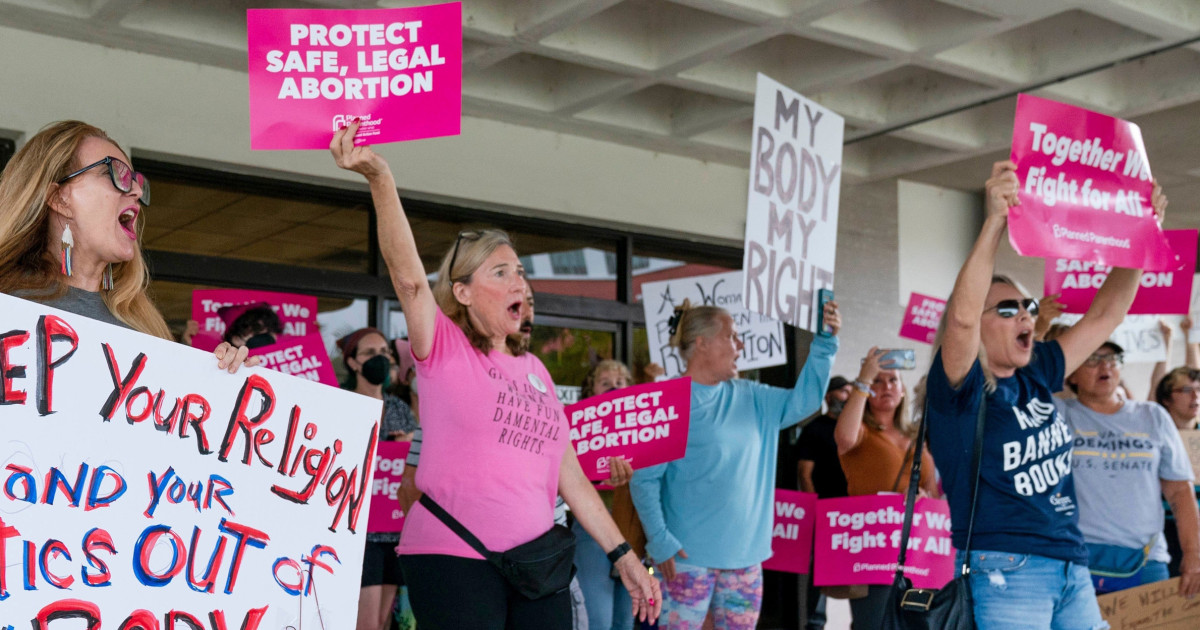
A proposed amendment to enshrine access to abortion in Florida’s constitution moved one step closer to appearing on the November ballot after a coalition of reproductive rights advocates surpassed the required number of validated signatures on Friday.
Floridians Protecting Freedom, the group leading the ballot effort, collected more than 910,000 validated signatures of registered voters — more than the nearly 892,000 they needed to move forward with the process of getting their proposal on the ballot — according to the Florida Division of Elections, which has tracked the validated signatures.
At least 150,000 of the collected and validated signatures came from registered Republican voters, underscoring the broad support for abortion rights across political lines.
The proposed ballot measure seeks a state constitutional amendment to bar restrictions on abortion before fetal viability, considered to be at about the 24th week of pregnancy. It would include exceptions past that point for “the patient’s health, as determined by the patient’s healthcare provider.”
If the amendment appears on the ballot and is ultimately passed next year, it would effectively undo the state’s current 15-week ban, as well as a more-recently passed six-week ban — both of which remain blocked by the courts.
“The fact that we only launched our campaign eight months ago and we’ve already reached our petition goal speaks to the unprecedented support and momentum there is to get politicians out of our private lives and health care decisions,” Floridians Protecting Freedom campaign director Lauren Brenzel said in a statement. “Most initiative campaigns never make it this far. The ones that do usually spend far more or take much longer to qualify, which is why we’re so confident that voters will approve our amendment once they’re given a chance to vote.”
Major obstacles remain on the path to placing the ballot measure, however.
The Florida Supreme Court said Wednesday it would hear a challenge launched by conservatives in the state to a proposed initiative.
Taking the case gives the court’s conservative majority the opportunity to prevent voters from deciding on the proposed measure in November, even though group behind has collected the required number of signatures for it to appear. Five of the seven justices on the court have been appointed by Republican Gov. Ron DeSantis, a fierce opponent of abortion.
Oral arguments in the case are scheduled for Feb. 7.
The case stems from a brief filed last fall by Florida Attorney General Ashley Moody, a Republican, to the state Supreme Court in urging the court to keep the question from appearing on the ballot altogether, regardless of the outcome of the signature collection.
Moody filed her brief, which slams the proposed measure as an effort designed to “hoodwink” voters, after Floridians Protecting Freedom had surpassed the number of validated signatures for their measure that, under Florida law, triggers a review of the proposed language by the state Supreme Court.
The court has until April 1 to approve or reject the proposed language.
In addition, Florida officials may also still review whether the abortion rights coalition complied with other state rules governing the signature collection process, including the requirement that signatures were collected from at least half of the state’s 28 congressional districts.
Floridians Protecting Freedom had faced a Feb. 1 deadline to collect nearly 892,000 validated signatures, so reaching the goal early provides the groups with time to overcome those and other potential challenges.
The effort by pro-abortion groups in Florida to place the ballot measure is one of at least 10 across the U.S. seeking to put abortion rights directly in the hands of voters in 2024.
Having an abortion question on the ballot could help boost Democratic turnout in the 2024 presidential election.
Similar ballot measure efforts are underway in Nevada, Arizona, South Dakota and several other states — all fresh steps in a movement that took off after the Supreme Court overturned Roe v. Wade in June 2022. Since that ruling, ballot measures backing abortion rights have won in every election, including in conservative states like Kentucky and Kansas, and red-leaning states like Ohio.
Additional unique obstacles remain in Florida for reproductive rights groups, even if their measure eventually makes the ballot.
For example, unlike in many other states, the measure would have to receive the support of 60% of voters in November — not a simple majority — to pass.
Currently, abortion is legal in Florida up to 15 weeks, though that law’s future will be determined by the state Supreme Court. However, if the court upholds the law, the decision would actually mean that a six-week abortion ban, with exceptions for rape, incest and the mother’s life — which was enacted earlier this year but remains blocked — would be allowed to stand.